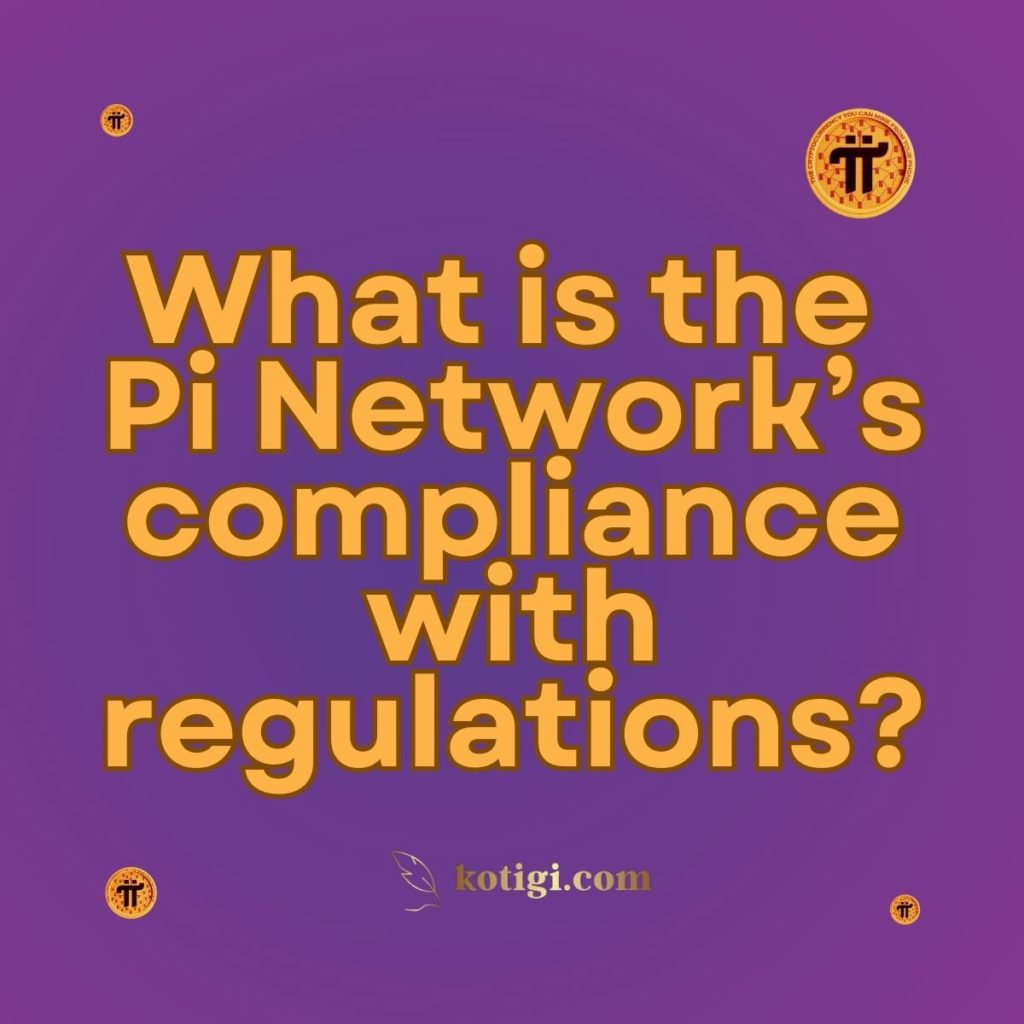
What is the Pi Network’s compliance with regulations?
Pi Network ensures compliance with global regulations through its KYC process, adherence to anti-money laundering (AML) guidelines, and alignment with data privacy laws such as GDPR. This commitment to regulatory compliance helps protect its users and fosters trust in the network’s operations.
Introduction
As a decentralized cryptocurrency platform, Pi Network must navigate the complex landscape of global financial and data privacy regulations. In an era of increasing scrutiny over digital currencies and online transactions, regulatory compliance is critical to building trust and ensuring the sustainability of the platform. This article explores Pi Network’s approach to compliance with regulations, including Know Your Customer (KYC) protocols, anti-money laundering (AML) measures, and data privacy standards.
Understanding Regulatory Compliance in Cryptocurrency
The Importance of Regulatory Compliance
In the rapidly evolving world of cryptocurrency, regulatory compliance is essential for ensuring legitimacy, user protection, and long-term growth. Regulatory bodies across the globe have implemented rules to safeguard against illegal activities such as money laundering, fraud, and data breaches. For cryptocurrency platforms like Pi Network, adhering to these regulations helps foster a secure and transparent ecosystem where users can confidently participate.
Failure to comply with regulations can lead to significant consequences, including legal actions, fines, and a loss of trust among users. As the cryptocurrency industry continues to grow, regulatory compliance will remain a top priority for platforms like Pi Network.
Challenges for Cryptocurrency Platforms
Cryptocurrency platforms face unique challenges when it comes to regulatory compliance. The decentralized nature of these networks, combined with the global reach of their users, means they must navigate varying laws and regulations across different jurisdictions. Furthermore, cryptocurrencies are often subject to heightened scrutiny due to their potential use in money laundering, fraud, and other illicit activities.
For Pi Network, maintaining compliance involves implementing systems and processes that not only meet regulatory standards but also support the platform’s goal of decentralization and accessibility.
Pi Network’s KYC Protocols
What is KYC?
Know Your Customer (KYC) is a regulatory requirement that financial institutions and cryptocurrency platforms must follow to verify the identity of their users. KYC protocols are designed to prevent illegal activities, such as money laundering and fraud, by ensuring that users are real individuals and not anonymous actors engaging in malicious behavior.
For Pi Network, KYC is a cornerstone of its compliance strategy. It ensures that each user is a verified individual, creating a safer and more transparent environment for the platform’s community.
How Pi Network Implements KYC?
Pi Network’s KYC process involves collecting and verifying personal information from its users, such as government-issued identification and proof of identity. This process is conducted through the Pi app, and users must complete KYC verification to access certain features, such as withdrawing Pi tokens.
By enforcing KYC, Pi Network ensures that its users comply with international standards and regulatory requirements. This helps prevent the creation of fake accounts, reduces the risk of illegal activities, and enhances the overall security of the platform.
Adherence to Anti-Money Laundering (AML) Guidelines
Understanding AML Regulations
Anti-money laundering (AML) regulations are designed to prevent the use of cryptocurrency platforms for laundering illegal funds. These regulations require platforms like Pi Network to monitor user activity, report suspicious transactions, and implement measures to detect and prevent money laundering.
Given the decentralized nature of cryptocurrency, AML compliance is crucial to ensuring that Pi Network cannot be exploited by bad actors for illicit financial activities. Adhering to AML guidelines demonstrates Pi Network’s commitment to upholding the integrity of its platform.
Pi Network’s AML Compliance
Pi Network follows AML regulations by implementing transaction monitoring tools and protocols to identify suspicious activity. This involves tracking large or unusual transactions, as well as flagging accounts that display patterns associated with money laundering. The platform may also conduct additional verification checks on accounts suspected of engaging in illegal activities.
In addition to monitoring transactions, Pi Network educates its users about the risks associated with money laundering and the importance of compliance. By promoting a culture of transparency and accountability, Pi Network strengthens its defenses against illicit activities.
Compliance with Data Privacy Regulations
The Role of Data Privacy in Cryptocurrency
Data privacy is a significant concern in the cryptocurrency industry, particularly given the amount of personal information collected during KYC processes. Regulatory bodies, such as the European Union’s General Data Protection Regulation (GDPR), have implemented stringent guidelines to protect user data and ensure that organizations handle personal information responsibly.
For Pi Network, compliance with data privacy regulations is essential to maintaining user trust and safeguarding sensitive information. As the platform grows, its commitment to data privacy becomes even more critical in ensuring that users’ personal information is protected from breaches and misuse.
Pi Network’s Data Privacy Practices
Pi Network is committed to complying with data privacy laws, such as GDPR. This involves ensuring that users’ personal data is collected, stored, and processed in a secure manner. The platform takes steps to limit the amount of personal data it collects, only using information that is necessary for regulatory compliance and user verification.
Furthermore, Pi Network provides users with control over their data, allowing them to request access to their information or delete their data if they choose to leave the platform. By adhering to data privacy regulations, Pi Network demonstrates its dedication to protecting user information and ensuring a safe environment for all.
Global Regulatory Compliance
Navigating Different Jurisdictions
Given the global nature of Pi Network, the platform must comply with a wide range of regulatory frameworks. Cryptocurrency regulations vary significantly across countries, with some regions adopting more favorable approaches, while others impose stricter rules. For Pi Network, ensuring compliance with regulations in multiple jurisdictions requires constant vigilance and adaptation.
The platform works with legal experts to stay informed about changes in global cryptocurrency regulations and updates its processes accordingly. This ensures that Pi Network remains compliant while expanding its reach to new markets and jurisdictions.
Cross-Border Transaction Monitoring
One of the key challenges in maintaining global regulatory compliance is monitoring cross-border transactions. Since Pi Network operates in multiple countries, it must ensure that its transaction monitoring tools can detect suspicious activities across borders. This involves coordinating with regulatory bodies and financial institutions to prevent money laundering and other illicit activities.
By staying proactive in its approach to global compliance, Pi Network is able to operate in diverse regulatory environments while maintaining the highest standards of security and transparency.
Compliance-Driven Innovation
Integrating Compliance into Product Development
Pi Network has integrated regulatory compliance into its product development process. This means that every new feature or service is designed with compliance in mind. Whether it’s introducing a new transaction system or enhancing user verification protocols, Pi Network ensures that all developments align with regulatory standards.
This compliance-driven innovation not only helps Pi Network stay ahead of evolving regulations but also enhances the security and trustworthiness of its platform. By prioritizing compliance in its development strategy, Pi Network positions itself as a leader in the cryptocurrency industry.
The Future of Compliance in Cryptocurrency
As the cryptocurrency industry continues to grow, regulatory frameworks will become more complex and demanding. Pi Network is committed to staying ahead of these changes by continuously improving its compliance processes and ensuring that it meets the highest standards of regulatory adherence.
The future of cryptocurrency will likely involve greater collaboration between platforms and regulatory bodies, as well as the introduction of more comprehensive regulations. Pi Network’s proactive approach to compliance will enable it to navigate these changes and continue providing a secure and reliable platform for its users.
Conclusion
Pi Network’s compliance with global regulations is a key factor in its success as a decentralized cryptocurrency platform. Through its KYC protocols, adherence to AML guidelines, and commitment to data privacy, Pi Network ensures that its users are protected and that the platform operates within the bounds of the law. As the regulatory landscape evolves, Pi Network will continue to prioritize compliance to build a secure and trusted environment for its growing community.
Key Takeaways
- Pi Network ensures compliance with global regulations through KYC, AML, and data privacy measures.
- KYC verification helps prevent fraud and ensures that users are real individuals.
- Anti-money laundering (AML) compliance involves monitoring transactions and reporting suspicious activity.
- Pi Network adheres to data privacy laws, such as GDPR, to protect users’ personal information.
- The platform’s proactive approach to regulatory compliance ensures long-term security and trust.


